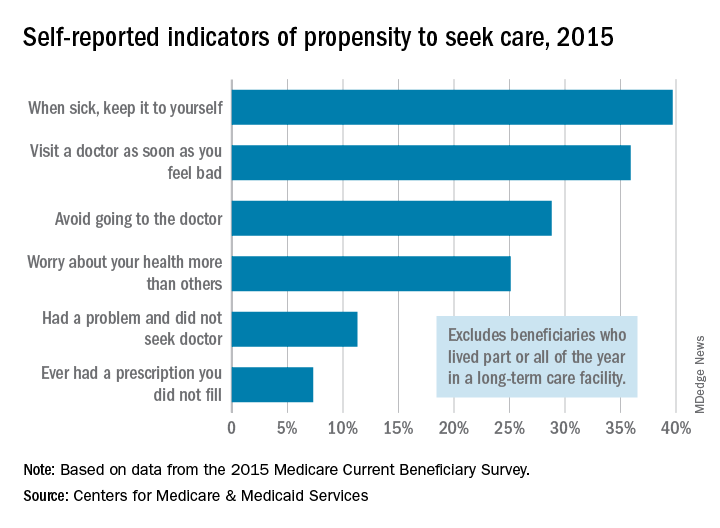Some people are more likely to seek medical care, and some people are less likely, but which type is more common? The results of a survey of over 14,000 Medicare beneficiaries suggest that the avoid-care type may be a bit more prevalent.
In the survey, 40% of respondents said that they were more likely to keep it to themselves when they got sick, but 36% visit a physician as soon as they feel bad. Almost 29% reported that they avoid going to a physician, but 25% worry about their own health more than others, the Centers for Medicare & Medicaid Services reported based on the results of the 2015 Medicare Current Beneficiary Survey.
The last two questions on propensity to seek care put the avoid-care type in the minority, albeit a somewhat disturbing one: , the CMS noted.Race and ethnicity made a big difference for some questions: 59% of Hispanics said that they visit a doctor as soon as they feel bad, compared with 44% of non-Hispanic blacks and 31% of non-Hispanic whites. That same order was seen for “worry about your health more than others” – 54% Hispanic, 38% black, and 19% white – and for “avoid going to the doctor” – 44% Hispanic, 34% black, and 26% white, the CMS reported.
The three groups, which were the only race/ethnicities included in the report, were all around 40% for “when sick, keep it to yourself,” while two of the three were the same for “had a problem and did not seek a doctor” (blacks and Hispanics at 14% and whites at 10%) and for “ever had a prescription you did not fill” (whites and Hispanics at 7% and blacks at 10%), the report said.
The estimates on propensity to seek care did not include Medicare recipients who lived part or all of the year in a long-term care facility, which was about 4% of the Medicare population in 2015. The survey included a total of 14,068 respondents.

